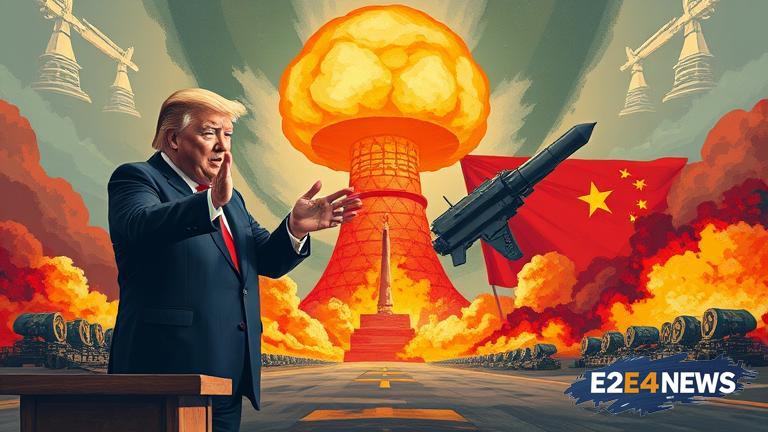In a recent statement, US President Donald Trump expressed his commitment to preventing the proliferation of nuclear weapons, particularly in regards to Russia and China. Trump emphasized the importance of maintaining global stability and security, stating that the spread of nuclear arms would have catastrophic consequences. The President’s remarks come amidst rising tensions between the US and its geopolitical rivals, with Russia and China actively pursuing the development and modernization of their nuclear capabilities. Trump’s administration has been vocal about its concerns regarding the nuclear ambitions of these nations, and has taken steps to strengthen the US nuclear deterrent. The President’s vow to halt nuclear proliferation is seen as a key aspect of his foreign policy agenda, with the goal of maintaining the US’s position as a global leader in nuclear security. Russia and China have been accused of violating international treaties and agreements, including the Intermediate-Range Nuclear Forces Treaty, which the US withdrew from in 2019. The two nations have also been investing heavily in the development of new nuclear technologies, including hypersonic missiles and advanced submarines. Trump’s pledge to prevent nuclear proliferation has been met with skepticism by some experts, who argue that the US’s own nuclear modernization efforts may be contributing to the problem. Others have praised the President’s commitment to non-proliferation, citing the need for strong leadership in the face of growing global threats. The issue of nuclear proliferation is complex and multifaceted, with various nations and organizations playing a role in the development and dissemination of nuclear technologies. The US has long been a proponent of non-proliferation efforts, and has worked to strengthen international agreements and institutions aimed at preventing the spread of nuclear arms. Despite these efforts, the threat of nuclear proliferation remains a pressing concern, with the potential for devastating consequences in the event of a nuclear conflict. Trump’s vow to halt nuclear proliferation is seen as a crucial step in addressing this threat, and in maintaining global stability and security. The President’s administration has been working to build a coalition of like-minded nations to address the issue of nuclear proliferation, and has engaged in diplomatic efforts to persuade Russia and China to abandon their nuclear ambitions. However, the path forward is likely to be challenging, with significant obstacles and complexities to be overcome. The US will need to balance its own nuclear modernization efforts with its commitment to non-proliferation, while also navigating the complex web of international relationships and alliances. Ultimately, the success of Trump’s pledge to halt nuclear proliferation will depend on a range of factors, including the willingness of Russia and China to cooperate, as well as the ability of the international community to come together in support of non-proliferation efforts. The stakes are high, with the potential for nuclear conflict posing an existential threat to humanity. As such, the issue of nuclear proliferation must be addressed with urgency and seriousness, and the international community must work together to prevent the spread of nuclear arms. The US, as a global leader in nuclear security, has a critical role to play in this effort, and Trump’s pledge to halt nuclear proliferation is an important step in the right direction. However, much work remains to be done, and the road ahead will be long and challenging. The international community must remain vigilant and committed to the cause of non-proliferation, and must work together to address the complex and multifaceted threat of nuclear proliferation. The consequences of failure are too great to contemplate, and the need for action is clear. The US, Russia, China, and other nations must put aside their differences and work towards a common goal of preventing the spread of nuclear arms, and maintaining global stability and security. The future of humanity depends on it.
